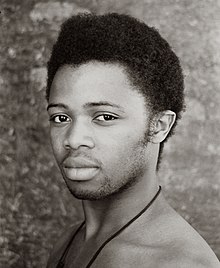
Gabriel Contino, better known as Gabriel o Pensador is a Brazilian rapper, writer, and composer known for his conscious lyrics which speak of activism, and issues of race, politics, social problems, and the Catholic church. Gabriel began his music career when he launched a demo tape containing the song "Tô Feliz " I'm Happy landing him a contract with Sony Music. Since then he has released eight albums: Ainda É Só o Começo, Quebra-Cabeça, Nádegas a Declarar, Gabriel o Pensador, Seja Você Mesmo , MTV ao Vivo, Cavaleiro Andante and Sem Crise. Gabriel has also written three books: "Diário Noturno", "Um Garoto Chamado Rorbeto" and "Meu Pequeno Rubro-Negro". "Um Garoto Chamado Rorbeto" won the "Prêmio Jabuti", for best Children's literature.

Portuguese hip hop, more commonly called hip hop tuga, is the Portuguese variety of hip hop music. It differs from mainstream hip hop because it has strong influences from African music, from Lusophone Africa, reggae, zouk and fado.
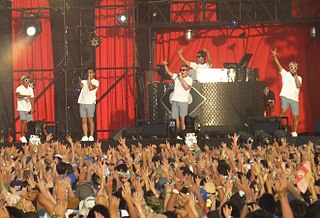
Rip Slyme is a Japanese hip hop group. In its best known incarnation, it was primarily composed of four MCs and a DJ, Fumiya. Pes and Su have since parted ways with the group. Their sound is influenced by old-school hip hop and other western rappers such as The Pharcyde, De La Soul, Public Enemy, Jurassic 5, the Beastie Boys, DJ Premier and Leaders of the New School.
Ruthless Records was an American Independent record label founded by Eric "Eazy-E" Wright and Jerry Heller in Compton, California in 1987. All of the Ruthless trademarks have been owned by Comptown Records, Inc. since 1987. Several artists and groups on the label such as N.W.A, Eazy-E, MC Ren, The D.O.C., Michel'le, and Bone Thugs-n-Harmony have released RIAA certified albums.

Ângelo César do Rosário Firmino, better known by the stage name Boss AC is a Portuguese rapper originally from Cape Verde. The letters A and C, in Boss AC, come from the initials of his two names, Ângelo and César, respectively.
European hip hop refers to hip hop music and culture originating from Europe. Emerging in the 1980s following the genre's popularity in the United States, European hip hop has evolved into a diverse and influential musical movement. It encompasses a wide range of styles and subgenres, reflecting the continent's varied cultural landscapes and the experiences of both ethnic nationals and immigrant communities. Notable regional scenes include British hip hop and grime, German hip hop featuring both ethnic German and Turkish artists, and French hip hop, which has undergone several distinct eras of development. Other countries such as the Netherlands, Italy, Poland, and Romania have also produced significant hip hop scenes, each with its own unique characteristics and prominent artists.

Samuel Martins Torres Santiago Mira, better known by his stage name Sam the Kid, is a Portuguese rapper and producer from Chelas, in the civil parish of Marvila, Lisbon.
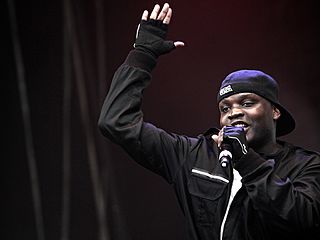
Keidje Torres Lima is a Portuguese language political hip hop artist, known professionally as Valete. that has enjoyed critical success in his home country of Portugal.
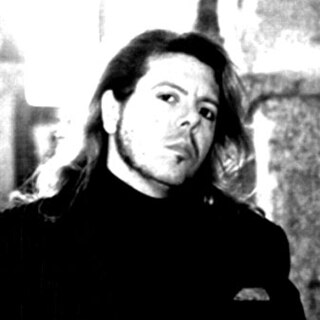
Pedro Luís Neves is a Portuguese modern composer of classical music and author of several other genres.
Dealema is a long-running Portuguese hip-hop group based in Porto. Along with Mind Da Gap, they are one of the oldest hip-hop bands in Portugal and had major influence over the genre's development across the country. Their early influences included Mobb Deep, Wu-Tang Clan, and Nas. Dealema has been performing with the same lineup of Mundo, DJ Guze, Fuse, Expeão, and Maze since forming in 1996.
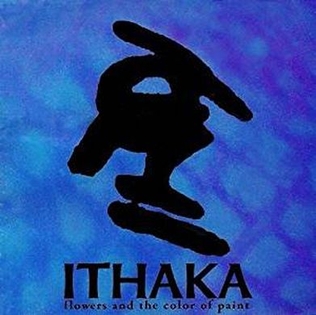
Flowers and the Color of Paint is a 1995 travel-oriented hip hop, downtempo and spoken word album by Californian lyricist, vocalist and visual artist, Ithaka.

Stellafly is the second full-length album to be released by Californian Alternative hip hop artist Ithaka.

Mingos & Os Samurais is the fifth studio album by Portuguese musician Rui Veloso, released on 7 August 1990 by EMI-Valentim de Carvalho. It is a concept album that tells the story of a small suburban band during the 1960s and the 1970s.

Marta Dias is a São Toméan Portuguese singer of jazz, world music and fado who has recorded several solo albums and has additionally recorded and toured extensively with guitarist António Chainho. She has also appeared on several Hip hop releases, including the Ithaka song, Escape From The City Of Angels, which appeared in Columbia Pictures's feature film release, The Replacement Killers in 1998.

"Who's the Enemy?" is an English-language alternative hip hop anti-war song by Californian artist/songwriter Ithaka and Brazilian rapper and author, Gabriel o Pensador. The song was originally included on the album, Recorded in Rio, released for the first time in association with Blitz Magazine (Portugal) in 2004. It would later be featured on the soundtrack of the 2006 film, Lost Jewel of the Atlantic, directed by Jacob Holcomb and produced by World Surfing Reserves. The song promotes world peace, containing lyrical references to former U.S. President George W. Bush, The Cold War and global dictators.

José Mário Branco was a Portuguese singer-songwriter, actor, and record producer.
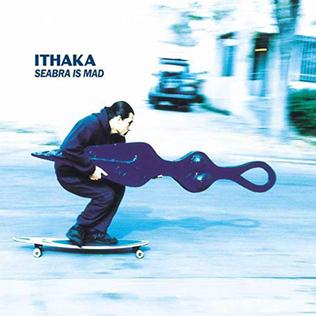
"Seabra Is Mad" is a 1997 drum and bass/alternative rock "story song" by Californian lyricist/vocalist Ithaka. The song was released as the first single from his second studio album Stellafly. Recorded in Portugal, it was produced by Joe Fossard featuring Ewan Butler on guitar and Sergio Nascimento on the chorus drums.

Vou Dar de Beber à Dor is a fado album recorded by Amália Rodrigues and released in 1969 on the EMI and Valentim de Carvalho labels. Amália was accompanied by musicians Domingos Camarinha on Portuguese guitar, Castro Mota on viola, and by Raúl Nery's guitar ensemble. The songs were recorded at Valentim de Carvalho de Paço d'Arcos studios. The album cover features a photograph by Augusto Cabrita.
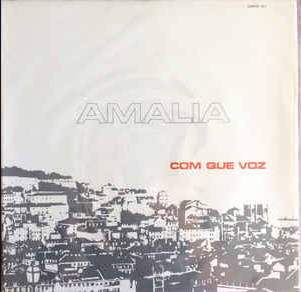
Com Que Voz is a fado album recorded by Amália Rodrigues in January 1969 and released in March 1970 on the EMI and Valentim de Carvalho labels. It reached No. 1 on the Associação Fonográfica Portuguesa (AFP) chart in Portugal. Amália was accompanied on the album by Pedro Leal on viola and José Fontes Rocha on Portuguese guitar.

Ithaka Darin Pappas, known professionally as Ithaka, is an American-born multidisciplinary artist of Greek ancestry who creates using music, writing, sculpture and photography. He has authored a collection of short stories, entitled Ravenshark Chronicles published in international magazines and periodicals, which have sometimes been the basis for his travel-oriented lyrical content. In a 2005 article for the magazine Waves, journalist Ricardo Macario described Ithaka as "The Miscellaneous Man". In a 2008 review of Ithaka's sixth album Saltwater Nomad, the online surf-culture platform Surfline stated that "the artist effortlessly traverses at ease between all of his choses mediums of expression [music, sculpture, writing and photography]", and that "his life's journey is a soulful balancing act somewhere between the worlds of euphoric creation and aquatic diversion."
